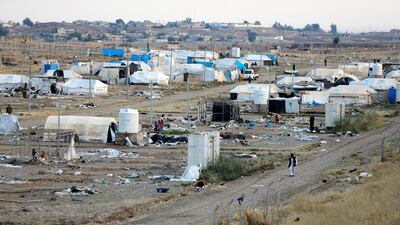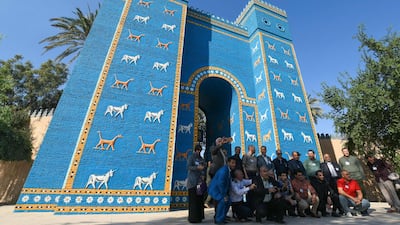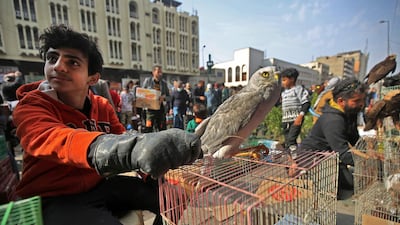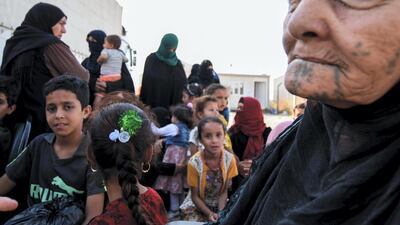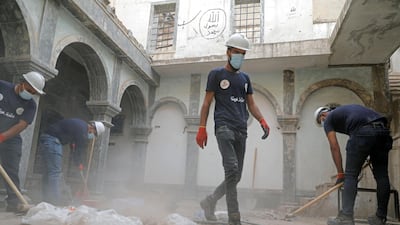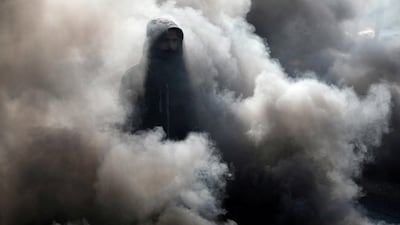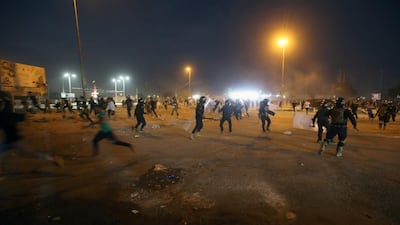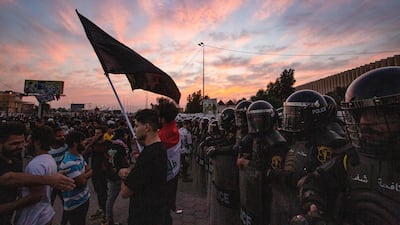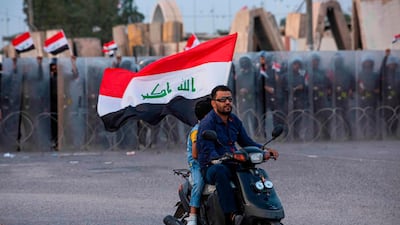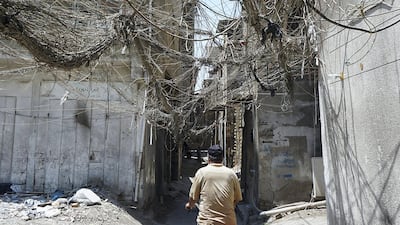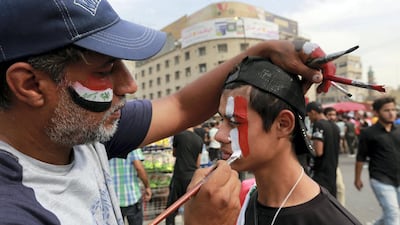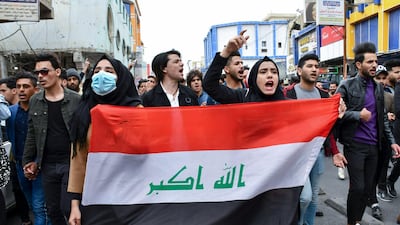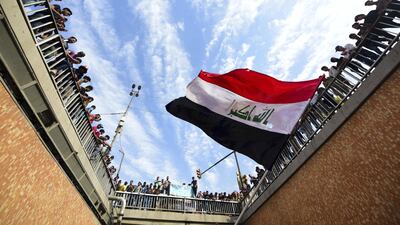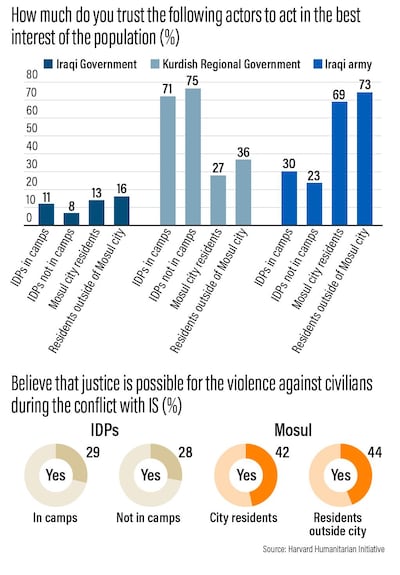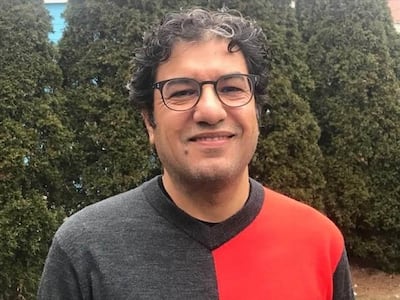It was in the summer of 2003, just after the US invasion of Iraq and ousted president Saddam Hussein’s escape, that Abdulrazzaq Al Saiedi sought to understand what Iraqis like him really thought about the former regime and what hopes they had for the country's future.
More than 17 years and seven governments later, to Mr Al Saiedi's dismay, people’s trust in the judiciary and its ability to hold people to account is still as low now as it was back then.
"The sense we got in 2003 from focus groups was at least that people were hopeful for what is to come," Mr Al Saiedi told The National.
The era of ideology is over. Nowadays, people assess their governments on their ability to provide them with a decent and prosperous standard of living
A survey last year of more than 5,000 people conducted by Mr Al Saiedi, shows sentiments have remained starkly the same across Mosul and among people who fled the northern city during the ISIS occupation.
“Despite the difference in demographics between the people staying in and around Mosul and internally displaced persons, this absence of trust was the common denominator,” he said in an online conference held to discuss his findings.
In the 2019 study, Mosulites said they trust the army more than IDPs did, most likely because of the military’s role in liberating Iraq’s second largest city from the grasp of ISIS in 2017.
Iraq then and now
In a 2003 debrief, while working with a human rights group, Mr Al Saiedi attended a coalition force briefing to discuss restoring electricity to the capital.
“They said there would be power shortages that year. It frustrated me to hear that people would not have electricity before the summer heat,” he said.
Now, electricity scarcity remains a painful sore and to Mr Al Saiedi, a reminder that the status quo has not changed more than a 15 years later.
An International Energy Agency report last year showed that power cuts occur daily even though available supply has increased by a third.
After leaving Iraq, Mr Al Saiedi worked as a journalist, a human rights officer and earned a master’s degree in public administration from the Harvard Kennedy School at Harvard University in the US.
“People ask me about the US invasion and I tell them that we had won," he said.
"We won our freedom. But we lost our security.”
Yet without the fall of Saddam Hussein, Mr Al Saiedi and others like him would not have had the opportunity to report on Iraq’s realities.
“We had no freedom of the press; no ability to speak out against the government.”
Through his research, Mr Al Saiedi hopes that policy makers heed the public’s call for better governance and stronger trust.
“The era of ideology is over. Nowadays, people assess their governments on their ability to provide them with a decent and prosperous standard of living," he said.
Little has changed under Mustafa Al Kadhimi
The Iraqi people made their feelings about the state of the country clear when anti-government protests swept the nation in October last year. The ongoing demonstrations caused then-prime minister Adel Abdul Mahdi to resign in May. Hundreds of protesters were killed or injured in violent crackdowns carried out by the security forces.
The demonstrations brought Iraqi Prime Minister Mustafa Al Kadhimi to power, but one year later, his government has made little progress in tackling the protesters' demands.
Basic services, electricity, jobs, an end to corruption and accountability for hundreds of civilian deaths are just some of the items on that list.
But for now, it remains uncertain whether Mr Al Saiedi will be getting the same responses from disillusioned Iraqis another decade from now.
Prop idols
Girls full-contact rugby may be in its infancy in the Middle East, but there are already a number of role models for players to look up to.
Sophie Shams (Dubai Exiles mini, England sevens international)
An Emirati student who is blazing a trail in rugby. She first learnt the game at Dubai Exiles and captained her JESS Primary school team. After going to study geophysics at university in the UK, she scored a sensational try in a cup final at Twickenham. She has played for England sevens, and is now contracted to top Premiership club Saracens.
----
Seren Gough-Walters (Sharjah Wanderers mini, Wales rugby league international)
Few players anywhere will have taken a more circuitous route to playing rugby on Sky Sports. Gough-Walters was born in Al Wasl Hospital in Dubai, raised in Sharjah, did not take up rugby seriously till she was 15, has a master’s in global governance and ethics, and once worked as an immigration officer at the British Embassy in Abu Dhabi. In the summer of 2021 she played for Wales against England in rugby league, in a match that was broadcast live on TV.
----
Erin King (Dubai Hurricanes mini, Ireland sevens international)
Aged five, Australia-born King went to Dubai Hurricanes training at The Sevens with her brothers. She immediately struck up a deep affection for rugby. She returned to the city at the end of last year to play at the Dubai Rugby Sevens in the colours of Ireland in the Women’s World Series tournament on Pitch 1.
Scream%20VI
%3Cp%3E%3Cstrong%3EDirectors%3A%3C%2Fstrong%3E%20Matt%20Bettinelli-Olpin%20and%20Tyler%20Gillett%3C%2Fp%3E%0A%3Cp%3E%3Cstrong%3EStars%3A%3C%2Fstrong%3E%20Melissa%20Barrera%2C%20Jasmin%20Savoy%20Brown%2C%20Jack%20Champion%2C%20Dermot%20Mulroney%2C%20Jenna%20Ortega%2C%20Hayden%20Panettiere%20and%20Courteney%20Cox%3C%2Fp%3E%0A%3Cp%3E%3Cstrong%3ERating%3A%3C%2Fstrong%3E%203%2F5%3C%2Fp%3E%0A
Infobox
Western Region Asia Cup Qualifier, Al Amerat, Oman
The two finalists advance to the next stage of qualifying, in Malaysia in August
Results
UAE beat Iran by 10 wickets
Kuwait beat Saudi Arabia by eight wickets
Oman beat Bahrain by nine wickets
Qatar beat Maldives by 106 runs
Monday fixtures
UAE v Kuwait, Iran v Saudi Arabia, Oman v Qatar, Maldives v Bahrain
Infiniti QX80 specs
Engine: twin-turbocharged 3.5-liter V6
Power: 450hp
Torque: 700Nm
Price: From Dh450,000, Autograph model from Dh510,000
Available: Now
The First Monday in May
Director: Andrew Rossi
Starring: Anna Wintour, Karl Lagerfeld, John Paul Gaultier, Rihanna
Three stars
What can victims do?
Always use only regulated platforms
Stop all transactions and communication on suspicion
Save all evidence (screenshots, chat logs, transaction IDs)
Report to local authorities
Warn others to prevent further harm
Courtesy: Crystal Intelligence
Top tips to avoid cyber fraud
Microsoft’s ‘hacker-in-chief’ David Weston, creator of the tech company’s Windows Red Team, advises simple steps to help people avoid falling victim to cyber fraud:
1. Always get the latest operating system on your smartphone or desktop, as it will have the latest innovations. An outdated OS can erode away all investments made in securing your device or system.
2. After installing the latest OS version, keep it patched; this means repairing system vulnerabilities which are discovered after the infrastructure components are released in the market. The vast majority of attacks are based on out of date components – there are missing patches.
3. Multi-factor authentication is required. Move away from passwords as fast as possible, particularly for anything financial. Cybercriminals are targeting money through compromising the users’ identity – his username and password. So, get on the next level of security using fingertips or facial recognition.
4. Move your personal as well as professional data to the cloud, which has advanced threat detection mechanisms and analytics to spot any attempt. Even if you are hit by some ransomware, the chances of restoring the stolen data are higher because everything is backed up.
5. Make the right hardware selection and always refresh it. We are in a time where a number of security improvement processes are reliant on new processors and chip sets that come with embedded security features. Buy a new personal computer with a trusted computing module that has fingerprint or biometric cameras as additional measures of protection.
Padmaavat
Director: Sanjay Leela Bhansali
Starring: Ranveer Singh, Deepika Padukone, Shahid Kapoor, Jim Sarbh
3.5/5
MORE ON TURKEY'S SYRIA OFFENCE
Mercedes V250 Avantgarde specs
Engine: 2.0-litre in-line four-cylinder turbo
Gearbox: 7-speed automatic
Power: 211hp at 5,500rpm
Torque: 350Nm
Fuel economy, combined: 6.0 l/100 km
Price: Dh235,000
UAE currency: the story behind the money in your pockets
Sour%20Grapes
%3Cp%3E%3Cstrong%3EAuthor%3A%20%3C%2Fstrong%3EZakaria%20Tamer%3Cbr%3E%3Cstrong%3EPublisher%3A%20%3C%2Fstrong%3ESyracuse%20University%20Press%3Cbr%3E%3Cstrong%3EPages%3A%20%3C%2Fstrong%3E176%3C%2Fp%3E%0A
Match info:
Manchester City 2
Sterling (8'), Walker (52')
Newcastle United 1
Yedlin (30')
'Top Gun: Maverick'
Rating: 4/5
Directed by: Joseph Kosinski
Starring: Tom Cruise, Val Kilmer, Jennifer Connelly, Jon Hamm, Miles Teller, Glen Powell, Ed Harris
MATCH INFO
Uefa Champions League semi-final, first leg
Bayern Munich v Real Madrid
When: April 25, 10.45pm kick-off (UAE)
Where: Allianz Arena, Munich
Live: BeIN Sports HD
Second leg: May 1, Santiago Bernabeu, Madrid
White hydrogen: Naturally occurring hydrogen
Chromite: Hard, metallic mineral containing iron oxide and chromium oxide
Ultramafic rocks: Dark-coloured rocks rich in magnesium or iron with very low silica content
Ophiolite: A section of the earth’s crust, which is oceanic in nature that has since been uplifted and exposed on land
Olivine: A commonly occurring magnesium iron silicate mineral that derives its name for its olive-green yellow-green colour
Red Joan
Director: Trevor Nunn
Starring: Judi Dench, Sophie Cookson, Tereza Srbova
Rating: 3/5 stars
French business
France has organised a delegation of leading businesses to travel to Syria. The group was led by French shipping giant CMA CGM, which struck a 30-year contract in May with the Syrian government to develop and run Latakia port. Also present were water and waste management company Suez, defence multinational Thales, and Ellipse Group, which is currently looking into rehabilitating Syrian hospitals.


